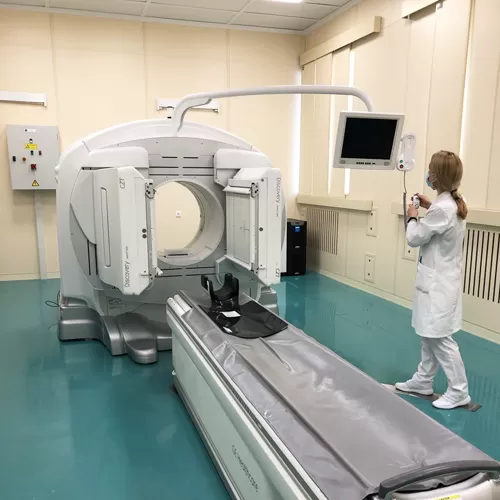
The Isotope Laboratory uses the energy of peaceful atom for diagnostics and treatment. Methods of nuclear medicine open up new possibilities in imaging of specific parts and organs of the body, and enable a whole new level of functional studies of lungs, brain, kidneys, liver, endocrine and skeletal systems.
One of the widespread and respected diagnostics method of nuclear medicine is scintigraphy, or single-photon emission computer tomography. A gamma-ray chamber, which traces radiopharmaceutical agents within the patient’s body, is used to generate diagnostic images. Unlike conventional X-ray imagery which reveals detailed anatomical organization of a body, isotope diagnostics methods offer insights into functioning of the body since they reflect important physiological and biochemical characteristics of specific body parts. Information obtained in the course of such diagnostic studies complements static X-ray images significantly and makes it possible for the physician to evaluate the condition and functional particularities of various organs which, in turn, enables critical decisions to be made and treatment regimen to be arranged individually for each patient.
PRIMARY OBJECTIVES OF THE ISOTOPE LABORATORY OF THE RCHCC
- Scientific research in the fields of carcinology, neurology and cardiology
- determining the location and dimensions of an organ or tissue including tumoral lesions
- imaging of blood flow through various organs including brain, lungs, liver and kidneys
- diagnostics of malignant changes such as cystic lesions, tumors, hematomas, bone tissue fractures, osteogenesis (brittle bone) areas, and pathologies of cortex and white matter
- assessment of cardiological functions and perfusion, and visualization of the same
- detection of the Calve-Perthes disease (femoral head necrosis), knee oesteoarthritis (arthroidal cartilage degeneration), metastatic disease of the liver, pathologies of the temporo-mandibular joint, small deep-seated hemangioma (a congenital anomaly where endothelia proliferation leads to the formation of tumor-like clusters), and bone tissue metabolism in cases of hyperparathyroidism (supersecretion of parathyroid glands) or thyrotoxicosis (a condition caused by excessive quantities of endogenous or exogenous thyroid hormone).
TERMS OF SERVICE PROVISION
The Isotope Laboratory performs a range of radionuclide diagnostics services to assigned patients and to patients serviced under health care contracts.
You may make a reservation to a planned consultation by calling the number 8 (017) 543-42-23 and 8 (017) 543-42-19 from 8.00 till 14.00.



